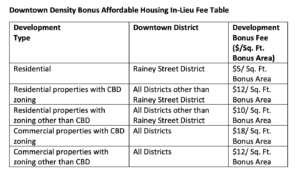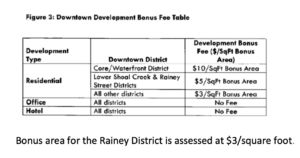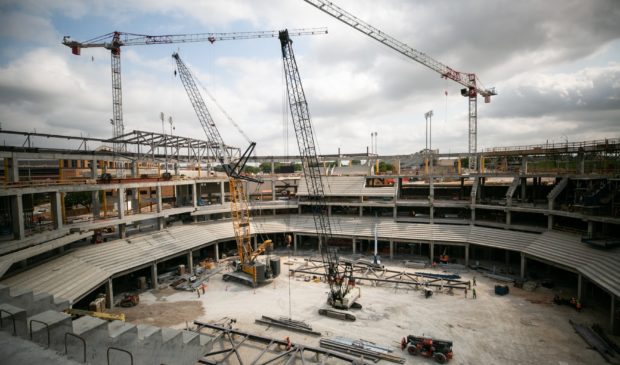Council adopts new interim fees for Downtown Density Bonus program
Friday, May 21, 2021 by
Jonathan Lee Developers of some downtown towers will have to pay more toward affordable housing after City Council voted 10-0-2 on Thursday to increase the Downtown Density Bonus program’s in-lieu fees.
The program offers developers more height and density in exchange for on-site affordable housing and/or fees-in-lieu toward housing vouchers and permanent supportive housing for people experiencing homelessness. The projects also must adhere to green building standards and urban design guidelines.
The program is one of several density bonus schemes the city uses to capture community benefits that developers might not otherwise provide. Well-calibrated fees, which benefit both developers and the city, are crucial to the success of such programs. Set the fees too high and developers won’t participate. Set the fees too low and the city could miss out on community benefits.
Because the new fees were calculated in 2019 as part of the failed Land Development Code rewrite, they are not perfectly calibrated. But they are only temporary. By August, city staffers will provide up-to-date fees for Council to adopt, adding them to the city’s fee schedule. The old fees were set in 2013.
Council Member Kathie Tovo pushed to adopt the 2019 fees as soon as possible. In April, she said that with the 2013 fees still in place, “We are really leaving money on the table.”
Others weren’t in such a rush. Mayor Pro Tem Natasha Harper-Madison and Council Member Paige Ellis preferred to adopt fees tuned to current conditions. Both abstained from Thursday’s vote on those grounds.
“I look forward to staff bringing us the recalibrated fees for our existing code in August,” Harper-Madison said. “However, I do still have serious concerns about implementing fees that were calibrated for a different code in different market conditions.”
The chart below depicts the interim fees (top) and the old fees (bottom). Residential projects in all areas have increased fees, and commercial projects will have to pay fees for the first time.


The tool used to calibrate the fees was developed by consultant EcoNorthwest in 2019. A memo by the consultant provides an in-depth explanation of the tool. City staffers plan to use the tool each time they recalibrate fees, which could be as often as every year, though there is no requirement to do so that frequently.
Some Council members prefer annual recalibration, while others think such frequent changes could inject uncertainty into the development process, discouraging participation. Real estate development groups prefer updates every three years to provide projects with predictability, and city staffers have said they prefer this option as well.
Projects that have already submitted a site plan – or will before the ordinance goes into effect in 10 days – will be grandfathered into the program, meaning the 2013 fees would still apply.
Photo made available through a Creative Commons license.
The Austin Monitor’s work is made possible by donations from the community. Though our reporting covers donors from time to time, we are careful to keep business and editorial efforts separate while maintaining transparency. A complete list of donors is available here, and our code of ethics is explained here.
You're a community leader
And we’re honored you look to us for serious, in-depth news. You know a strong community needs local and dedicated watchdog reporting. We’re here for you and that won’t change. Now will you take the powerful next step and support our nonprofit news organization?








